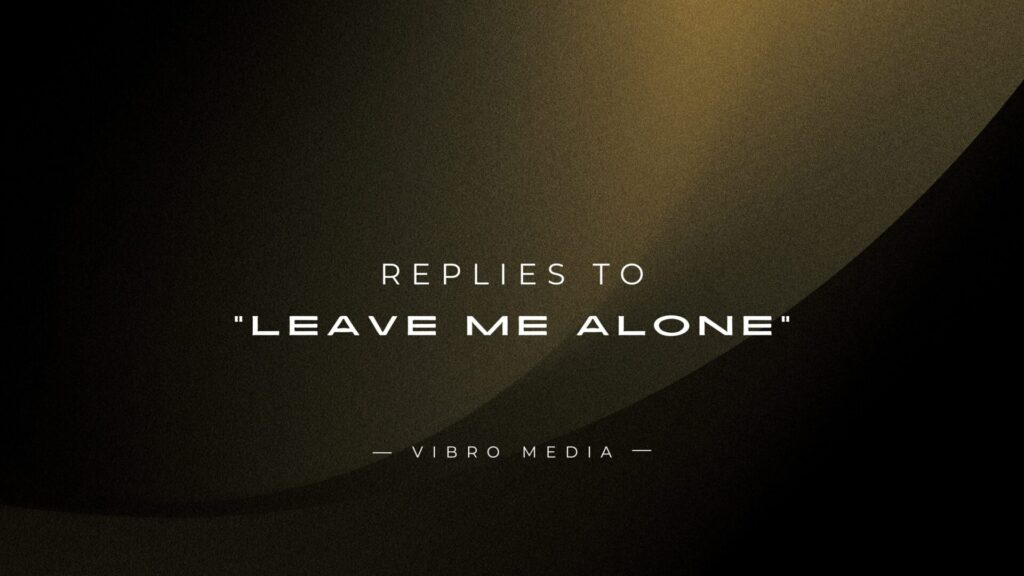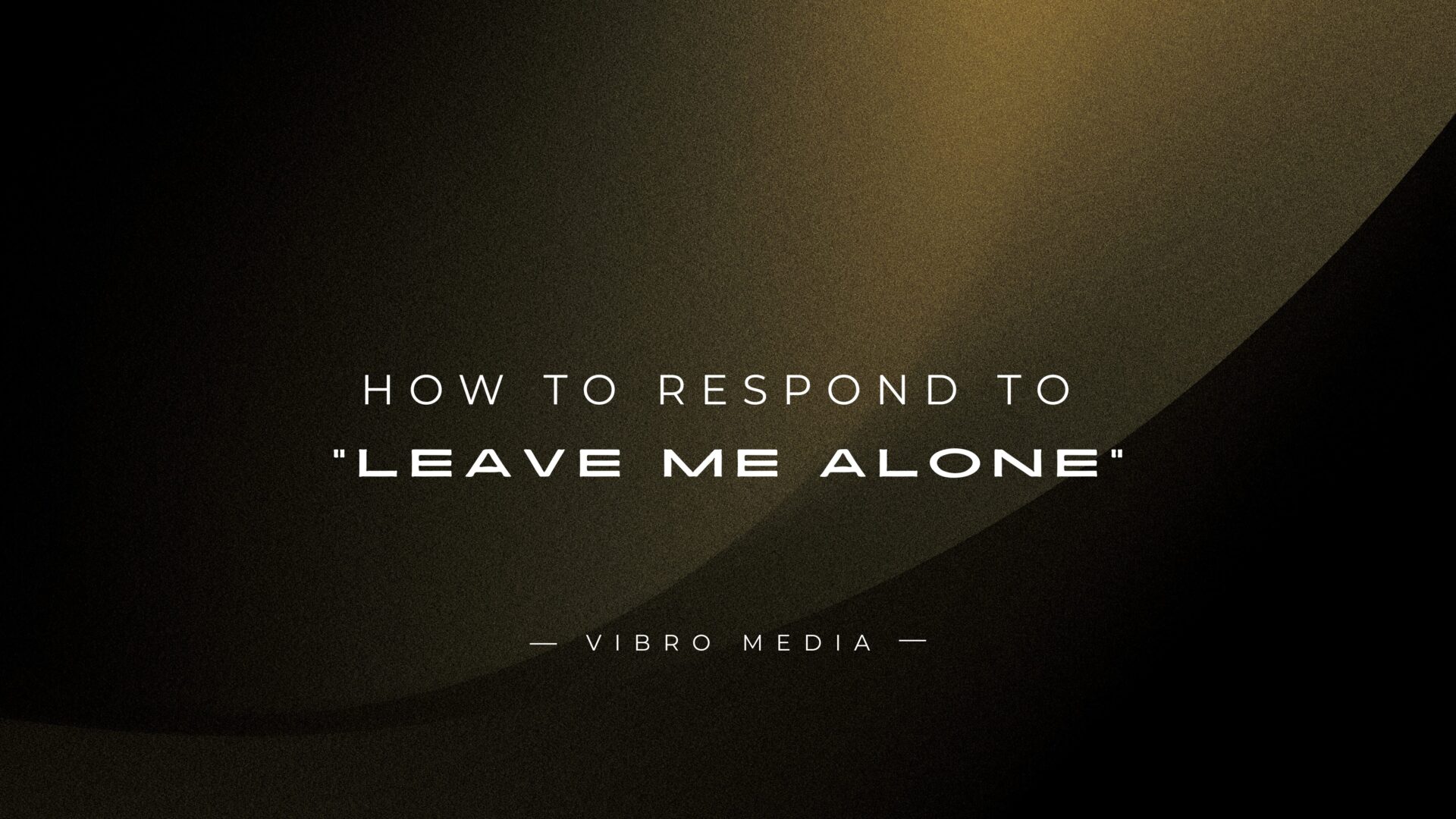Emotions can run high, and it’s not uncommon to hear someone say, “Leave me alone.” Knowing how to respond effectively in these situations is key, whether it comes from a loved one, a friend, or even a colleague. This phrase might sting, but it’s often a sign of someone needing space, time, or a break from an overwhelming moment. So, how do you respond to “Leave me alone” without worsening the situation?
This article will explore what this phrase can mean, why people say it, and how to respond with care and compassion. By the end, you’ll clearly understand the best ways to navigate these challenging emotional moments.
Understanding the Meaning Behind “Leave Me Alone”
- What Could “Leave Me Alone” Mean?
When someone says, “Leave me alone,” it can carry a variety of meanings depending on the context. Sometimes, it’s a direct request for solitude, while other times, it’s a reaction to feeling overwhelmed. It’s important to consider the tone, body language, and situation to grasp what the person might be trying to communicate fully.
- Emotional Triggers Leading to the Statement
Emotional triggers can lead to someone expressing a need for space. These triggers might include stress, frustration, anger, sadness, or even anxiety. It’s a coping mechanism that helps them protect themselves from further emotional harm, even if it means pushing others away temporarily.
- Common Scenarios Where This Phrase Is Used
“Leave me alone” can surface in various situations, such as a heated argument after a stressful day or when someone feels emotionally vulnerable. Recognising the context is crucial in responding appropriately.

200+ Replies to “Leave Me Alone”
Polite Responses
- I understand. I’ll give you some space.
- Of course, I’ll respect your wishes and step back.
- I’m sorry if I’m bothering you. I’ll leave you alone.
- I hear you. I’ll give you the time and space you need.
- No problem. I’ll make sure not to intrude further.
- I’ll back off. Please let me know if you need anything.
- I respect your need for space. I’ll be here if you need me.
- I understand it’s important for you to have some time alone. I’ll honour that.
- I’ll step away now. Don’t hesitate to reach out if you need to talk later.
- I appreciate your honesty. I’ll give you some room.
Defensive Responses
- Why do you need me to leave? I’m just trying to help.
- I didn’t realise I was bothering you. Is everything okay?
- I’m only here to support you. If I’m crossing a line, just let me know.
- I didn’t mean to intrude. Can we talk about what’s wrong?
- I’m just trying to be present. If that’s not what you want, I’ll back off.
- We were having a good conversation. Did I overstep?
- I’m confused by your request. Is there something specific I did?
- I’m here because I care. If you need me to go, just say so.
- I didn’t mean to intrude. Can you help me understand what’s bothering you?
- If there’s an issue, let’s talk it out. I’m here to listen.
Humorous Responses
- Alright, I’ll leave you alone—just don’t make me put on a disguise!
- Okay, I’ll back off. Just promise not to send a ‘Mission: Impossible’ team after me.
- I got it. I’ll give you space. I guess I’m not the ‘life of the party’ today!
- Sure thing! I’ll be over here working on my invisibility cloak.
- I hear you. I’ll disappear like a magician’s assistant. Poof!
- Alright, I’ll give you some room. I guess I’ll avoid any surprise visits!
- I’m out of here! I’ll make it like a tree and leave.
- Understood. I’ll retreat like a ninja—quietly and without a trace!
- Okay, I’m backing off. I promise I’m not turning into a stalker!
- Sure thing! I’ll leave you alone before I start singing ‘Don’t Stop Believin’!
Neutral Responses
- Okay, I’ll leave you alone for now.
- I got it. I’ll give you some space.
- Understood. I’ll step back and give you room.
- Alright, I’ll back off. Let me know if you need anything.
- I hear you. I’ll respect your need for space.
- Sure, I’ll give you the time you need.
- I’ll stay out of your way. Reach out if you want to talk later.
- No problem. I’ll step away for now.
- Okay, I’ll give you some alone time.
- You got it. I’ll be here if you change your mind.
Inquisitive Responses
- Is everything okay? Do you want to talk about what’s going on?
- Can you tell me what’s wrong? I want to understand and help.
- I’m here if you need someone to listen. What’s on your mind?
- I’ll give you space, but I’m curious if there’s something you’d like to share.
- Is there a specific reason you need me to leave? I’d like to understand.
- I’m sorry if I’m bothering you. Is there something we need to discuss?
- Do you want to talk about what’s bothering you? I’m here to listen.
- I understand you need space, but is there something you’d like to address?
- Can you let me know what’s going on? I’m concerned and want to help if I can.
- I’ll give you your space, but I’m all ears if you want to explain what’s wrong.
Dismissive Responses
- Fine, I’ll go away.
- Okay, whatever you say.
- Sure, I’m out of here.
- I got it. I’m not going to stick around.
- Alright, I’ll leave. Don’t make it a big deal.
- Okay, I’m backing off. It’s not worth arguing about.
- If that’s what you want, I’m gone.
- Fine, I’ll stop bothering you.
- I got it. I’ll take the hint.
- Alright, I’ll leave you to it—no need to be so abrupt.
Apologetic Responses
- I’m sorry if I’ve upset you. I didn’t mean to intrude.
- I apologise if I’m bothering you. I’ll give you the space you need.
- I’m sorry if I’ve overstepped. I’ll step back and respect your wishes.
- I didn’t realise I was making things worse. I’m truly sorry for that.
- I’m sorry if my presence is unwanted. I’ll leave you alone now.
- I didn’t mean to cause any stress. I’ll back off and give you some room.
- I apologise if I’m being a nuisance. I’ll make sure to stay away.
- I’m sorry if I’m intruding. I’ll give you the time you need.
- I didn’t mean to upset you. I’m sorry and will step back.
- I’m truly sorry if I’m bothering you. I’ll respect your space from now on.
Firm Responses
- If you need me to leave, I will. Just let me know if you need anything.
- Alright, I’ll respect your request and step back. I’m here if you need me.
- I understand. I’ll leave you alone. If you change your mind, I’m available.
- I got it. I’ll give you space. I won’t intrude any further.
- I’ll step away as you’ve asked. Let me know if you need anything later.
- I hear you. I’ll stop contacting you. Reach out if you need to talk.
- Okay, I’ll back off. I’ll respect your boundaries.
- Understood. I’ll give you the space you need. I’ll be here if you need help.
- I’ll leave you alone as requested. Please reach out if you need anything.
- I’ll respect your request and step away. If you need anything, don’t hesitate to ask.
Empathetic Responses
- I understand that you need some space right now. I’m here for you whenever you’re ready.
- I can see that you’re feeling overwhelmed. I’ll give you some time alone and be here if you need support.
- It sounds like you need some time to yourself. I’ll step back and check in with you later.
- I understand that you may be experiencing some difficulties. I’ll give you the space you need and be available to talk if you need me.
- I understand it’s important for you to have some alone time. I’ll respect that and be available if you need anything.
- You need some quiet time. I’ll give you that space and be here if you need to reach out.
- I can tell you’re not in the mood for company right now. I’ll give you your space and be here if you need to talk later.
- I understand that you need to be alone right now. However, I’ll step back and be available to chat if you want.
- It sounds like you’re going through something tough. I’ll respect your need for space and be here to support you.
- I understand that you need time to yourself. I’ll respect that and be here for you whenever you’re ready to reach out.
Reassuring Responses
- I’ll give you the space you need. Just know I’m here if you need support later.
- I understand you need some time alone. I’m confident everything will be okay.
- I’ll step back for now. If you need anything, I’m just a call away.
- It’s okay to take time for yourself. I’m here to talk with you later.
- I’ll respect your need for space. If there’s anything I can do, let me know.
- I’m giving you the space you need. I’m here to help whenever you’re ready.
- I’ll give you time alone but don’t hesitate to reach out if you need anything.
- I’ll step away for now. Rest assured, I’m here to support you when you’re ready.
- I understand you need space. I’ll be around if you decide you want to talk.
- I’ll respect your space. Know that I’m here for you if you need any support.
Self-Reflective Responses
- I’ll think about why you might need space and try to understand better.
- I didn’t realise I was intruding. I’ll reflect on how to approach you differently.
- I will consider doing something to upset you.
- I’ll take this time to reflect on how I can better respect your boundaries.
- I’ll think about how I can improve my approach to avoid this in the future.
- I’ll reflect on our interactions and see if I need to adjust anything.
- I didn’t mean to overstep. I’ll consider what might have led to this.
- I’ll use this time to think about how to be more mindful of your needs.
- I’ll reflect on our conversation and how I can better support you in the future.
- I will consider how to respect your space more effectively.
Playful Responses
- Alright, I’m vanishing like a magician’s assistant. Poof! See you later!
- Okay, I’ll give you some space. Just don’t start a dance party without me!
- Sure thing! I’ll be over here perfecting my ninja stealth skills.
- I got it. I’m off to become a world-class hide-and-seek champion.
- Understood. I’ll leave you alone and work on my secret superhero training.
- Alright, I’m out of here. Don’t worry; I won’t be spying from behind the curtains!
- I’ll give you your space. I’m off to practice my interpretive dance moves.
- Okay, I’ll disappear like a cat in a game of hide-and-seek. Meow!
- I got it. I’ll be here working on my stand-up comedy routine—just for you!
- Alright, I’m gone! Just don’t start a party without me, okay?
Encouraging Dialogue
- I understand you need space, but I’m here to listen if you want to talk later.
- I’ll give you some time, but feel free to reach out if you want to discuss what’s on your mind.
- I’ll step back now, but I’m available if you want to share what’s bothering you.
- I’ll respect your space. I’m here and ready to listen if you want to talk later.
- I’ll give you the space you need. I’m open and here for you if you want to talk.
- I’ll back off for now, but don’t hesitate to contact me if you want to discuss what’s going on.
- I understand you need some time alone. If you feel like discussing it later, I’m here for you.
- I’ll give you your space. I’m available whenever you’re ready to talk about anything.
- I’ll step away as requested. If you want to talk or need anything, just let me know.
- I’m giving you space now. I’m here to listen if you change your mind and want to talk.
Philosophical Responses
- Sometimes, we all need a moment to reflect and recharge. I respect your need for solitude.
- In the grand scheme of things, personal space is essential. I’ll give you the time you need.
- Everyone needs their own space to process things. I’ll step back and let you have your peace.
- Solitude can be a path to clarity. I’ll give you the space to find your way.
- In life, moments of solitude can lead to profound insights. I’ll respect your need for reflection.
- Sometimes, stepping away can provide the clarity we seek. I’ll honour your request for space.
- The journey to understanding often requires solitude. I’ll give you that space to explore your thoughts.
- Quiet moments can be vital for inner peace. I’ll respect your need for a break and be here if needed.
- Personal space is a valuable part of our journey. I’ll step aside and let you find your path.
- Reflection and solitude can be sources of strength. I’ll give you the room you need to gather your thoughts.
Motivational Responses
- Take all the time you need. I’m confident you’ll come through this stronger.
- I’ll give you space, but remember, you can get through whatever you face.
- It’s okay to need some time alone. Use this time to gather your strength—I believe in you.
- I’m stepping back for now, but know you can overcome this. I’m here if you need support.
- You’ve got this! Take the time you need, and remember you’re stronger than you think.
- I’ll respect your need for space. Just remember, you’re capable of handling whatever comes your way.
- I’ll give you some room, but I believe in your ability to navigate through this. You’re not alone.
- It’s okay to take a break. Use this time to recharge—you have the strength to face anything.
- I’m giving you space but trust in your resilience. You’ve got the strength to handle this.
- I’ll step back for now. Remember, you have the courage and determination to get through this.
Formal Responses
- Understood. I will respect your request and refrain from further communication.
- I acknowledge your need for solitude. I will ensure not to intrude further.
- Thank you for expressing your wishes. I will step back and not contact you further.
- I respect your request for privacy and will cease any further interaction now.
- I have noted your preference for space and will adhere to it.
- Your request is clear. I will honour your need for solitude and will be available if required.
- I will comply with your request and will not engage further unless necessary.
- I understand your need for personal space and will act accordingly.
- I appreciate your directness. I will ensure that I respect your boundaries moving forward.
- Acknowledged. I will provide the requested space and be here if you require assistance later.
Minimalist Responses
- Got it. I’ll leave you alone.
- Okay, I’m backing off.
- Understood. I’m out.
- Sure, I’ll step away.
- Alright, I’m leaving.
- Fine. I’ll give you space.
- Okay, I’m gone.
- Noted. I’ll stay away.
- Understood. I’ll go.
- I got it. I’m out of here.
Reflective Responses
- I’ll take a moment to reflect on why you might need space. I hope everything is okay.
- I’ll consider how my actions might have contributed to your need for solitude.
- I’ll think about what might have led to this request and how I can be more considerate.
- I’m reflecting on our interactions and how I can better respect your boundaries in the future.
- I’ll use this time to understand better why you need space and how I can adjust my approach.
- I’ll consider what might have caused you to feel this way and how I can improve.
- I will think about our conversation and how I overstepped.
- I’ll reflect on our interactions to better understand your need for space.
- I’ll take this time to think about how I can be more mindful of your needs moving forward.
- I’m reflecting on this request and how I can better respect your need for solitude.
Encouraging Independence
- I’ll give you the space you need. You’ve got the strength to handle this on your own.
- Take all the time you need. I believe in your ability to navigate this situation.
- I’ll step back and let you handle things. I know you’re capable of managing on your own.
- You’ve got this! I’ll give you the room to work things out by yourself.
- I understand you need some space. I trust you’ll find your way through this.
- I’ll step aside and let you take control. You have the skills to handle it.
- Take the time you need. I have faith in your ability to resolve this on your own.
- I’m giving you space because I know you’re strong and capable of handling it.
- I’ll give you the independence you need. You’re well-equipped to manage things.
- I’ll step back and let you handle things. I believe in your ability to find a solution.
Apologetic but Firm Responses
- I’m sorry if I’ve been intrusive. I respect your need for space and will not bother you further.
- I apologise if I’ve overstepped. I’ll give you the room you need and will not intrude again.
- I didn’t mean to upset you. I’ll step back and honour your request for solitude.
- I’m sorry if my presence has been unwelcome. I’ll respect your wishes and stay away.
- I’m sorry if I’ve caused you any discomfort. I’ll make sure to give you the space you requested.
- I’m genuinely sorry if I’ve been a nuisance. I’ll give you the space you need and will not interfere.
- I regret if I’ve been too persistent. I’ll back off and honour your need for solitude.
- I’m sorry if I’ve intruded. I’ll step aside and give you the space you’re asking for.
- I didn’t intend to overstep. I’m sorry and will respect your need to spend some time alone.
- I’m sorry if my presence has been bothersome. I’ll give you the space you need and won’t intrude further.
Why People Say “Leave Me Alone”
- The Need for Space
Sometimes, people just need space. It’s as simple as that. After all, everyone needs moments of solitude to recharge and process their emotions. When someone says, “Leave me alone,” it could be their way of asking for a mental reset.
- Feeling Overwhelmed
Life can be overwhelming, and emotions can pile up quickly. When this happens, people often need a break from everything, including conversation or interaction. They might say, “Leave me alone” to manage their emotional overflow.
- Emotional Self-Protection
In some cases, the phrase is used as a defence mechanism. When someone feels emotionally threatened or vulnerable, pushing others away can be a form of self-protection. It’s like putting up an emotional wall to avoid further hurt.
How to Respond to “Leave Me Alone” Calmly and Compassionately
- Taking a Step Back: Don’t React Instantly
When you hear “Leave me alone,” your first instinct might be to react immediately, but taking a step back is often better. Give them a moment to breathe and resist the urge to push further. This shows respect for their current emotional state.
- Acknowledging Their Feelings Without Taking It Personally
It’s easy to feel hurt when someone tells you to leave them alone, but understand it’s likely not about you. Acknowledge their feelings and tell them you’re there for them when they’re ready to talk. For example, saying something like, “I understand you need space right now, and I’m here when you’re ready,” can go a long way.
- Knowing When to Give Space vs. When to Offer Support
There’s a delicate balance between giving space and offering support. Pay attention to the person’s cues. If they seem to need time alone, respect that. But if they appear distressed or need comfort, gently let them know you’re available to help if they want it.
The Art of Listening in Emotional Situations
- Active Listening: What It Is and How to Do It
Active listening involves fully concentrating on what the other person is saying without interrupting or jumping to conclusions. It’s about being present in the moment, showing empathy, and avoiding judgment. When someone says, “Leave me alone,” they might not be ready to talk yet, but when they are, active listening can help you respond more effectively.
- Showing Empathy Without Overstepping Boundaries
Empathy is crucial in these situations, but it’s important not to overstep boundaries. Express your concern, but don’t push for more than the person is willing to share. Sometimes, just being there quietly can offer more comfort than any words.
- Recognising Non-Verbal Cues
Nonverbal cues often speak louder than words. Pay attention to their body language, facial expressions, and tone of voice. These can give you insight into their need for space, support, or a listening ear.
Different Contexts, Different Responses
- Responding to a Partner
When a romantic partner says, “Leave me alone,” it can be particularly challenging. In these moments, it’s essential to remember that relationships require patience and understanding. Respect their request for space, but also communicate that you’re there for them whenever they’re ready to talk.
- Responding to a Friend
It’s important to gauge the situation with friends. If a friend asks to be left alone, they might need a breather. Give them time, but send a gentle message after some time to show that you care and are available to listen when they’re ready.
- Responding to a Family Member
Family dynamics can be complicated. When a family member asks for space, it’s often tied to deep emotions. Give them the space they request, but check in later to maintain the relationship’s health and open communication.
When to Respect the Request for Space
- How Long Should You Wait Before Reaching Out Again?
Knowing when to reconnect can take time and effort. A good rule of thumb is to give them enough time to process their emotions, but not so much that they feel abandoned. Depending on the severity of the situation, this could be a few hours, a day, or even a few days.
- Understanding When Silence Is Beneficial
Sometimes, silence is golden. If someone needs time to decompress, respecting their silence can help repair the relationship. It allows them to regain their emotional balance and approach the situation with a clearer mind.
When to Reconnect After Giving Space
- Reaching Out Without Intruding
When it’s time to reconnect, approach the situation delicately. A simple message like, “I’m thinking of you and here if you want to talk,” can be non-intrusive while still showing care.
- Offering an Open Conversation
Let the person know that you’re available for an open, nonjudgmental conversation whenever they’re ready. This will relieve their pressure and let them know that they’re not alone.
Responding When You’re Hurt by the Statement
- Handling Your Own Emotions
It’s natural to feel hurt when someone says, “Leave me alone.” Take a moment to process your feelings before responding. Remember, their request for space is likely about their emotional state, not a reflection of their worth.
- Avoiding Conflict and Escalation
If you react defensively, the situation can escalate quickly. Instead, focus on de-escalating by acknowledging their feelings and managing your emotional response. This can prevent unnecessary conflict and keep the door open for future communication.
Setting Healthy Boundaries While Being Supportive
- Ensuring Mutual Respect in Relationships
Healthy relationships require mutual respect. While giving someone space when they need it is important, it’s equally important to communicate your boundaries. Ensure that both parties understand and respect each other’s emotional needs.
- Balancing Empathy with Self-Care
Being supportive doesn’t mean neglecting your well-being. It’s okay to take a step back to care for your emotional health while still offering support. Balancing empathy with self-care ensures that you’re not sacrificing your mental health in the process.
Mistakes to Avoid When Responding to “Leave Me Alone”
- Over-pushing for an Immediate Resolution
One of the biggest mistakes you can make is pushing for an immediate resolution. Trying to force someone to talk before they’re ready can push them further away. Patience is key.
- Reacting Defensively or Angrily
Letting your emotions get the best of you is easy, but reacting defensively or with anger will only complicate the situation. Instead, take a deep breath and approach the situation calmly.
- Ignoring the Person’s Feelings
Ignoring someone’s feelings can damage the relationship. Even if you don’t fully understand why they’re asking for space, respecting their request is crucial for maintaining trust and communication.
Responding to “Leave Me Alone” in a Professional Environment
- Navigating Professional Boundaries
Emotional responses can be tricky to navigate in a professional environment. If a colleague says, “Leave me alone,” it’s important to respect their boundaries while maintaining professionalism. Give them the space they need without making it a bigger issue.
- Understanding Emotional Health in the Workplace
Emotional health is just as important in the workplace as in personal relationships. Recognising when a colleague needs space and responding empathetically can foster a healthier, more supportive work environment.
Understanding When “Leave Me Alone” Might Be a Cry for Help
- Recognising Subtle Signs of Distress
Sometimes, “Leave me alone” is a cry for help in disguise. If you notice signs of distress, such as withdrawal, mood changes, or other indicators of emotional struggle, it may be worth gently checking in with the person to see if they’re okay.
- Knowing When to Intervene Gently
If you believe someone is emotionally distressed, intervening gently can make a difference. Approach the situation carefully and let them know you’re there for them, even if they’re not ready to talk yet.
How to Foster Open Communication Moving Forward
- Building Trust Through Honest Conversations
Open communication is the foundation of any healthy relationship. By having honest conversations, you can build trust and ensure that both parties feel heard and understood, even in difficult situations.
- Encouraging Emotional Vulnerability in Relationships
Encouraging emotional vulnerability means creating a safe space where people feel comfortable sharing their feelings without fear of judgment. This can lead to deeper, more meaningful connections in the future.
Conclusion
In conclusion, knowing how to respond to “Leave me alone” can make all the difference in handling tricky or awkward conversations. Whether you’re aiming to lighten the mood with humour or show genuine empathy, having a variety of responses at your disposal can help you navigate these situations confidently. Remember, the key is being mindful of the other person’s feelings while staying true to your own. If you’re looking for even more creative comebacks,
Check out our post on:
200+ Roasts That Will Leave Any “Nerds” in Stitches
FAQs
Q. What if someone constantly tells me to leave them alone?
If someone frequently asks for space, it is important to respect their wishes and have an open conversation about the underlying issue. Repeated requests for space may indicate a deeper concern that needs addressing.
Q. How can I respond without making the situation worse?
The key is to stay calm and avoid reacting impulsively. Acknowledge their feelings and give them the space they need, letting them know you’re available when they’re ready.
Q. How long should I wait before reaching out after giving space?
It depends on the situation. You might wait a few hours, a day, or even longer. Pay attention to the person’s cues and try to gauge when they might be ready to reconnect.
Q. What if I’m struggling to handle my own emotions in the moment?
It’s okay to step back and process your emotions before responding. Managing your feelings can help you approach the situation more calmly and effectively.
Q. Is it ever okay to ignore someone’s request to be left alone?
In most cases, it’s best to respect the person’s request. However, if you believe they are in danger or experiencing significant distress, it may be necessary to intervene carefully.











1 thought on “How to Respond to “Leave Me Alone” : 200+ Replies”